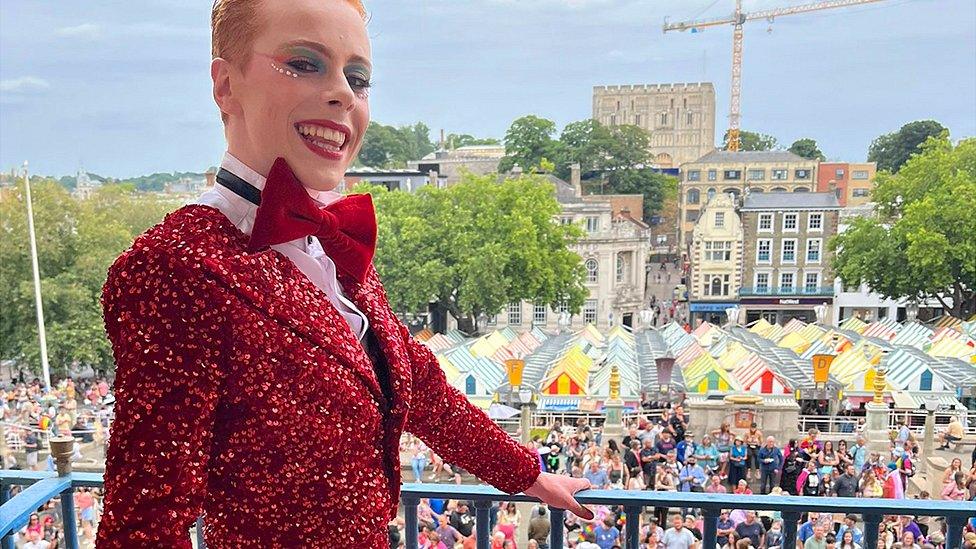What does Census 2021 data mean for Norwich's bisexual community?
- Published
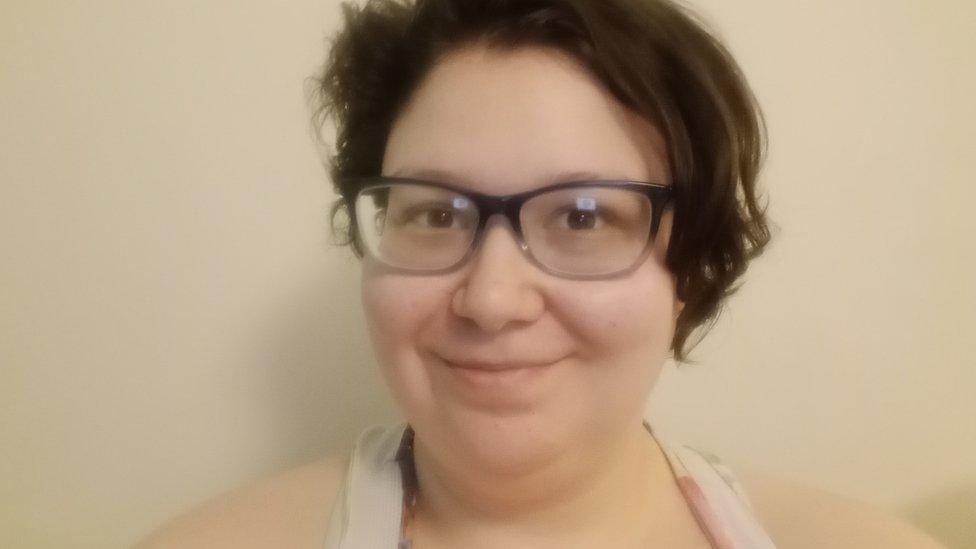
Cet Heartkin says Norwich's queer community works hard to support its members
Census 2021 data shows Norwich is the bisexual capital of England and Wales. What do the figures mean for the city's bisexual community?
Ask Cet Heartkin, 31, why Norwich has the highest percentage of people identifying as bisexual in England and Wales and they are clear on the reasons why.
They point to its status as a university city, with a young, vibrant population that has thrived, as a result of like-minded people coming together and sharing thoughts and experiences.
"Norwich has always been an island in Norfolk - we've always welcomed strangers and people who are different," says Cet.
According to the Office of National Statistics, 3.89% of Norwich's 213,000 people identify as bisexual, external, the highest of any local authority in England and Wales. In the City Centre West area of Norwich, the figure rises to nearly 7% of the population.
"If you're in the queer community in any regard, most of the people you know are bi," says Cet.
"I also know of quite a few people who have moved from Brighton to Norwich, so there's the fact we're seen as a queer city on par with Brighton and just as safe."
The relationship and sex educator, who is also a drag artist, moved to Great Yarmouth from London as a child before relocating to Norwich about five years ago.
Cet identifies as non-binary and has a husband, but is also in a polyamorous relationship with a boyfriend and a non-binary partner.
"Culturally, it's a very different kettle of fish," they say. "People in Norwich tend to be a lot more open to ideas and don't tend to bat an eyelid if you say you're bisexual.
"There's a preconception that bisexuals are greedy; that we cheat," they say.
"All of my partners know about each other; they're all friends.
"It takes a lot of communication and emotional work to have three relationships at the same time - but cheating and lying is harder."
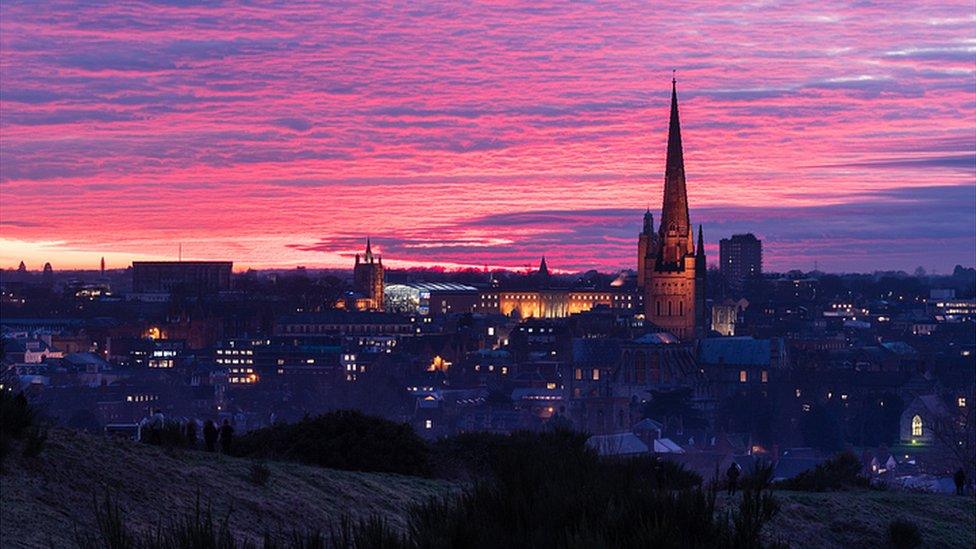
"There are lots of places for queer people to be themselves, but we're the ones who have had to work for that - we've had to build that from scratch," says Cet
Cet says while Norwich generally feels a safe place, they are concerned about the treatment of trans and non-binary people.
"We saw this in the summer, with the protests and counter-protests for the Drag Story Time at The Forum.
"It was really nice to see the community of Norwich stand up for the queer community, but there was still a lot of rhetoric that was being said that was harmful."
Cet says they hope the new data revealed in the census will go some way to improving policies on training and education around LGBTQ+ issues in institutions such as the local police force and councils.
And they say while events like Norwich's Pride celebration are important in the city's calendar, there still needs to be more emphasis on inclusivity all year round.
But Cet, who is a member of the city's Pride choir, says the local LGBTQ+ community itself is solid.
"The queer community in the city works really, really hard to support each other.
"I'm really proud to live in Norwich because of that," they say.
"There are lots of places for queer people to be themselves, but we're the ones who have had to work for that - we've had to build that from scratch.
"The more we're seen and that people know we exist, the more that positive things can happen."
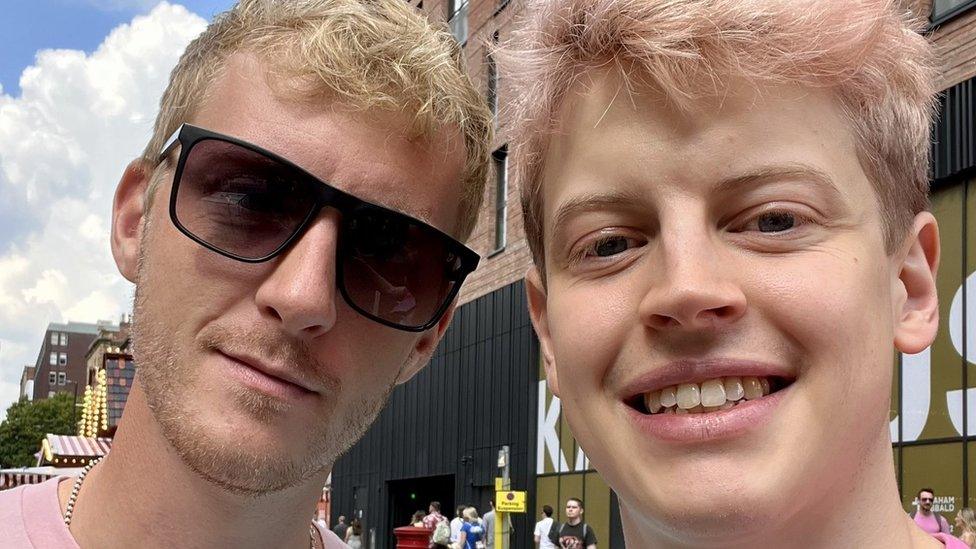
Dr Sam Rowe (right), with boyfriend Chris, says several Norwich shops and businesses display the Pride colours
Dr Sam Rowe grew up in a village on the border of Suffolk and Norfolk before moving to Norwich about eight years ago.
"I am bisexual; I only came out about two years ago," says the 32-year-old, who works as a public engagement officer at Norwich Research Park.
He says while Norwich's LGBTQ+ community might not be vast, it is "very relaxed and very welcoming".
For that, he says, he feels "very lucky".
"It feels relatively safe, too. If I am holding hands with my boyfriend then that feels completely comfortable; although that's as much an individual thing than about a city."
What would he like to see change, if anything, now that these statistics are known for the first time?
"It would be nice to have more LGBT places - we have a few pubs and clubs but there isn't a community space, somewhere that isn't about drinking."

Aaron Campbell arrived at the University of East Anglia (UEA) in Norwich as a 19-year-old undergraduate from London, when he made the decision to come out as bisexual.
"I remember turning up to my first ever university Pride Society meeting and literally having a panic attack - it was a big momentous occasion for me," he says.
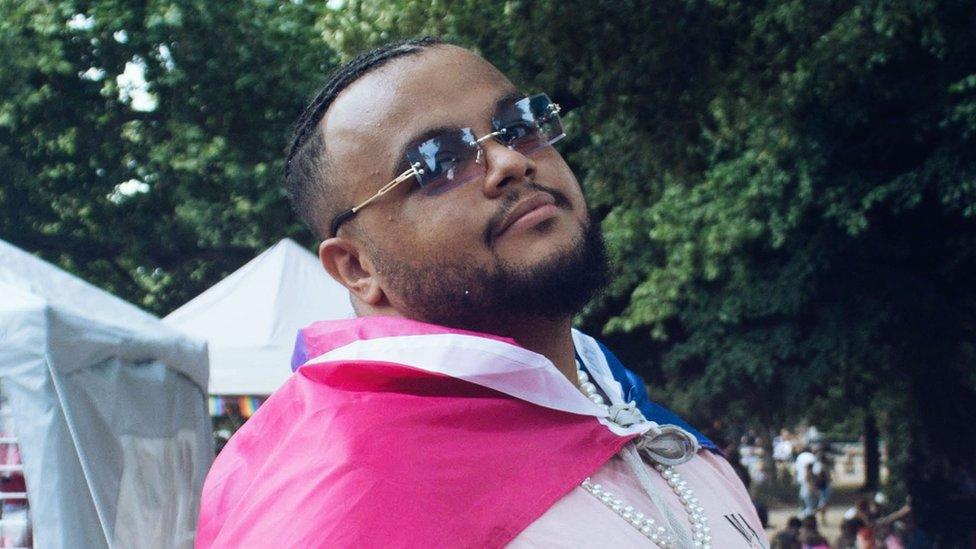
Mr Campbell says he hopes the new census statistics will show local businesses and organisations the LGBT+ community has a bigger presence than perhaps previously thought
He found a "comfort" in Norwich and, now, as the university's Students' Union welfare, community and diversity officer, he is determined to pay back some of the good deeds he experienced when starting at the campus.
"The president and vice president at the time took me under their wing and supported me," says the 24-year-old.
"I think back to the predecessor of my role and how she would get me involved, and make sure I was being looked after and come to talk to me.
"A lot of these things made me feel part of the community.
"The Students' Union has done so much for me and my personal journey of coming out."

You might also be interested in:

He says he feels the city's LGBTQ+ community has a "homeliness" to it and is more close-knit compared to London's.
"Sometimes you just feel a bit more overwhelmed," says Mr Campbell.
"Last year I went to both Pride parades and while I love London Pride, there were over two million people there and it was hot and heavy.
"But in Norwich, I felt I was in a place with people who I really knew."
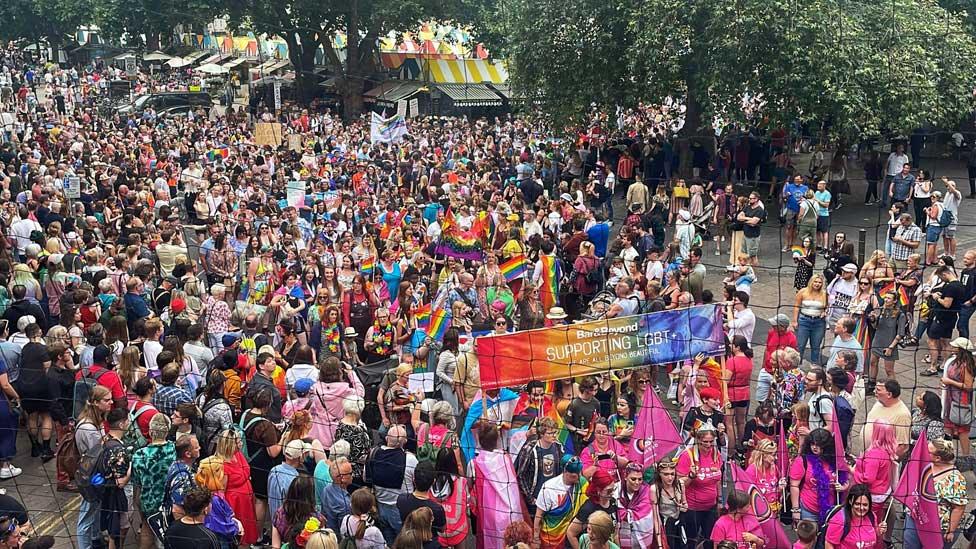
Mr Campbell says the city's LGBT+ community has a "homeliness" to it
Mr Campbell says he hopes the new census statistics will show local businesses and organisations the LGBTQ+ community has a bigger presence than perhaps previously thought.
"I think more could be done to show solidarity - there have been a lot of issues with homophobia and transphobia recently - which the university is very vocal about," he says.
"We must continue to create spaces - sometimes queer people are left on their own to do this - but it would be good to have that support to create bigger and better spaces."

Find BBC News: East of England on Facebook, external, Instagram, external and Twitter, external. If you have a story suggestion email eastofenglandnews@bbc.co.uk
- Published7 December 2022
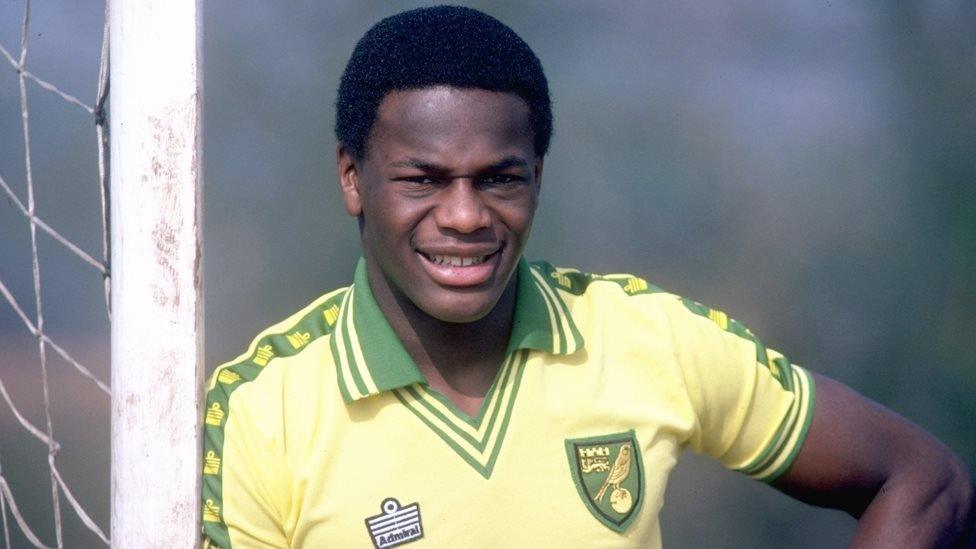
- Published6 December 2022
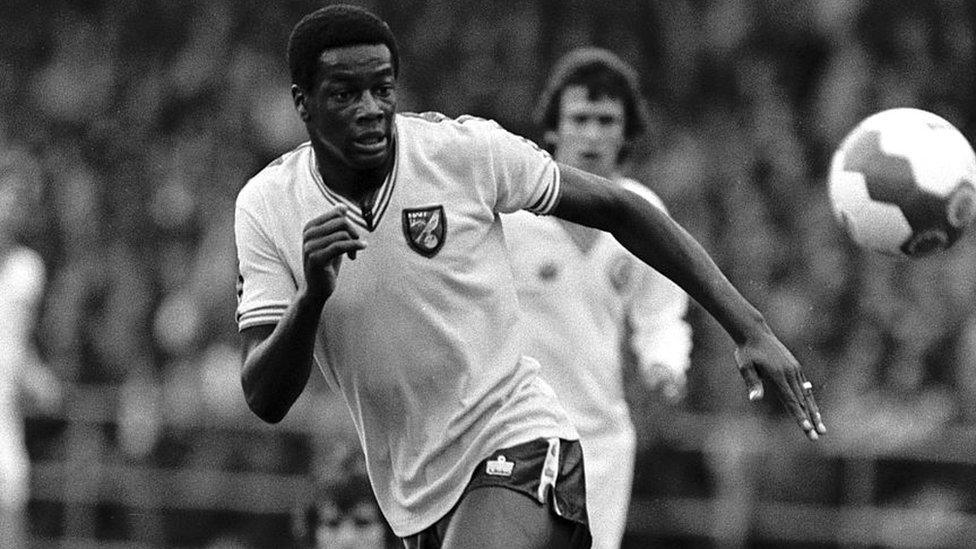
- Published26 September 2022
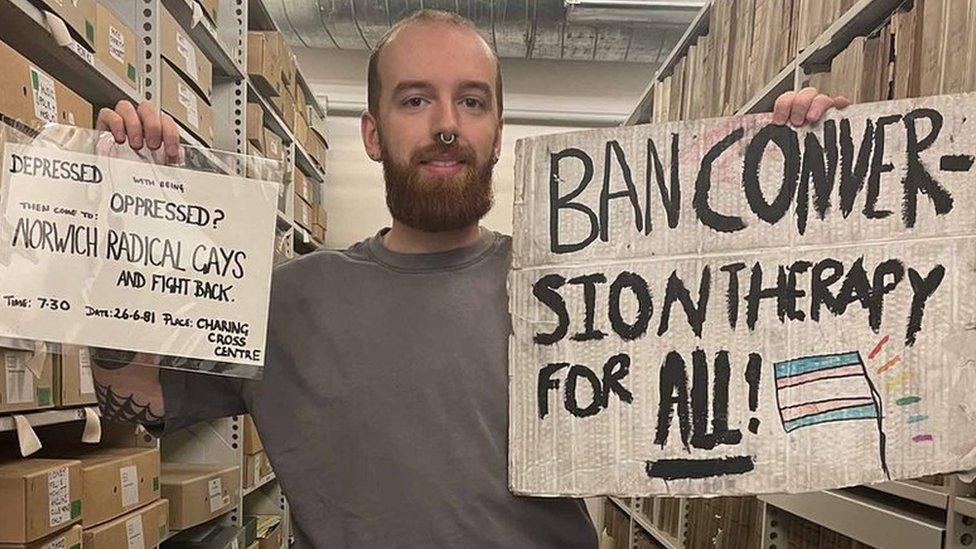
- Published3 August 2022
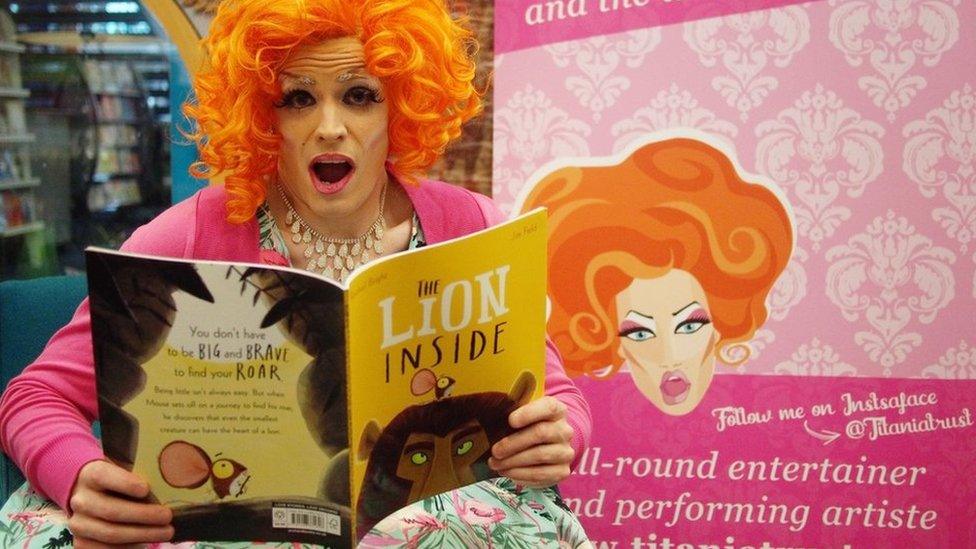
- Published30 July 2022
